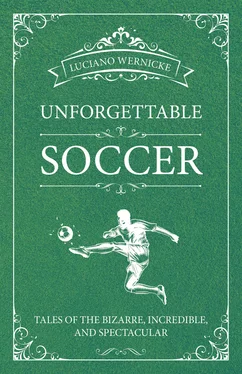THREE RED CARDS IN FOUR DAYS
Can anyone match the record of the clumsy Albanian defender Agim Shabani? This defender for the Norwegian club Fredrikstad FK was sent off for repeated fouls on June 24, 2007, the day on which his club fell as visitors 2-1 against Strømsgodset IF for the Norwegian Premier League. The next day, Shabani—just 19 years old—was summoned to play a reserve game. The man could not help himself and again saw the red card for lashing out a few kicks to the opposing players. On the 27th, 48 hours later, the young defender returned to wear the white shirt of Fredrikstad FK against Nybergsund IL-Trysil for the Norwegian Cup. That day, the whole stadium was paying attention to the performance of the Albanian, and he did not disappoint: Shabani was red carded again, and his team fell 1-2. If this man does not appear in the Guinness Book of World Records , it is because nobody thought to report this fantastic “feat” of three red cards in four days.
In 1978, the Cali Sports Association of Colombia achieved an unprecedented milestone for their country: reaching the final of the Copa Libertadores. Led by Argentine Carlos Bilardo, the squad—which had already surprised everyone by reaching the semifinal in 1977—forged an excellent campaign after prevailing in their group stage against their compatriots Club Deportivo Junior of Barranquilla and the Uruguayans Peñarol and Danubio Fútbol clubs.
In the round-robin semifinals, Deportivo Cali was undefeated after playing Alianza Lima of Peru and Cerro Porteño of Paraguay, two very good clubs. But, in the 180 minutes of the two-legged final, “the Greens” could not do much before the greater experience and remarkable efficiency of the Argentine team Boca Juniors. First was a goalless draw in Cali. This was followed by an unquestionable 4-0 in Buenos Aires which gave the “Xeneixe” (“Genoese,” as Boca fans and players are called), coached by Juan Carlos Lorenzo, their second consecutive continental title.
In his autobiography Doctor and Champion , Bilardo narrated a curious situation that occurred during the second leg in La Bombonera, home of the back-to-back champion: “From that second leg of the final of the Copa Libertadores I was left with something that shows that ‘Toto’ Lorenzo was a genius, an incredible guy. When we played against Boca at La Bombonera, Diego Umaña, from our team, a specialist in corner kicks, did not make any of them reach the penalty box. When the first half was over, I asked him: ‘Diego, what’s wrong with you? Why aren’t you sending the corner kicks to the penalty box?’ ‘Mister,’ he answered, ‘there’s a dog that will not let me kick.’ ‘A police dog?’ I inquired. ‘Yes. Every time I went to the corner flag, I had him on top, he stuck to me. He wanted to eat my leg! So I couldn’t kick well,’ he said. A few days later, when I watched the video replay of that game very carefully, I noticed that Umaña had not lied: Every time we had a corner kick in our favor, the policeman who controlled the dog would let go a bit of rope. There was no place to take a run to the ball! Above all, the dog was very fierce, he barked and threatened to bite poor Umaña. Then, I understood why Diego, with good sense, would have chosen to throw bad corner kicks before leaving the field with one leg less. The ‘Toto’ was very crafty. A genius!”
Shortly before the start of the 1906 first division championship in Argentina, the legendary goalkeeper José Laforia went to Alumni Athletic Club, leaving his former squad, Barracas Athletic Club, without a substitute starter. (Both clubs are now defunct in the soccer universe.) Faced with this emergency situation, Barracas, who did not have another goalkeeper, was forced to try different field players at the goal, but since none of them excelled in that role, the search continued for a new candidate continued daily.
On August 26 of that year, the men from Barracas had to travel to the town of Campana in Buenos Aires—which is located about 32 miles (60 km) north of the City of Buenos Aires—to face the Reformer Athletic Club, a modest group made up of employees from a refrigerator factory. That cold morning, only eight players showed up at the Retiro train station to make the trip to the rival’s field. On the way to Campana, the players decided on a revolutionary strategy to counteract the numerical disadvantage: They entrusted the difficult task of guarding the goal to Winston Coe, one of the founding partners of the team, who usually served as defender on the right. But their strategy did not serve them well against the Reformer squad, who won by a resounding victory of 11-0 against the disadvantaged team from Buenos Aires. However, the chronicles of the time—including the newspaper La Nación —praised the work of Coe, who was mainly responsible for Barracas not suffering an even more humiliating rout despite one important physical disadvantage…Coe did not have a left arm!
THE MATCH WITH NO OPPONENT
Hampden Park was overflowing. Newspapers from Glasgow assure us that on April 19, 1879, a day in which the final match of the Scottish Cup between Rangers FC (local institution that had already begun to have a popular fan base though they still had not obtained a title) and Vale of Leven Football & Athletic Club (squad from the city of Alexandria) was played, there was a “never before seen” crowd “inside and outside the stadium.”
The 9,000 seats were sold out, and the match had to be delayed for half an hour while the police fought hard to restore order to the spectators in the stands as well as the almost 3,000 fans that were left out on the street. The game began, and the Rangers were very efficient, with a fast goal scored by Willie Struthers. The striker was not finished, though, and, shortly after, scored again against the rival goalkeeper, Robert Parlane, with a powerful shot. But, as goals did not yet have nets at this time, the ball bounced off a spectator in the grandstand and, as quickly as it came out, returned to the field. The play surprised the referee, who did not see how the ball crossed the finish line. He ordered the play to continue, despite protests from the Rangers.
In the second half, Vale of Leven took advantage of a mistake by rival goalkeeper George Gillespie to equalize the score, which remained tied until the end. The Rangers’ players and fans were outraged. Their officials protested the result and offered the testimony of the person who had been struck by the uncounted Struthers’ goal—a professor of surgery at the University of Glasgow, “a gentleman whose word no Vale fan could doubt.” Despite the claim, the Scottish Association maintained the result and ordered the final match to be played again a week later on the same stage. However, on April 26, only one team showed up on the lawn of Hampden Park: Vale of Leven. The Rangers missed the appointment in retaliation against the Scottish Association’s decision
At the appointed time, and in the absence of the “blue” players, the referee gave the order and started a ridiculous match of Vale against…nobody! John McDougall, the captain, moved forward and played the ball with James Baird and Peter McGregor until he buried it in the empty goal. The ref—perhaps embarrassed by the unnecessary show—ended the charade, and Alexandria’s team lifted the cup for the second time. In the insert added to the base of the trophy, where all the champions are listed, it was written: “Vale of Leven, Rangers did not appear.”
A soccer match is an excellent target for advertising campaigns, both commercial and political. The massive competition and the vast variety of spectators make the stadium an important focus for marketing. This was understood perfectly by an intrepid promoter, who, on March 21, 1948, after boarding a plane, flew over the Gemeentelijk Parkstadion where the local team, Koninklijke Boom FC, and Beerschot Antwerpen Club were playing for the first division tournament of Belgium. The pilot, who had loaded the device with advertising flyers, descended, took a package, and threw it through the window to one of the bleachers. The pages dispersed, forming a colorful cloud that caught the attention of the fans, who stretched to grab one of the color papers raining down on them. A major success!
Читать дальше












